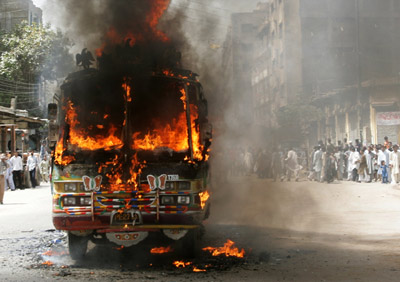| Home / International / International -- World | Tools: Save | Print | E-mail | Most Read |
| Roads, Schools Shut After Bombing |
| Adjust font size: |
Mobs of youths rioted in this southern city for a second straight day yesterday to protest a suicide bombing that killed at least 57 people, which a top Pakistani official said was aimed at "eliminating" the leadership of a moderate Sunni Muslim group.
Police yesterday confirmed that a lone unidentified suicide bomber detonated a 5-kilogram bomb near Sunni dignitaries seated in a downtown Karachi park on Tuesday at a religious service with 10,000 other worshippers. The service, to mark the birthday of Islam's Prophet Mohammad, was organized by moderate Sunni groups including the Tehrik group, whose top two leaders and a third senior official were among the 57 people killed, including the bomber. Amid soaring sectarian tensions, hundreds of security forces blocked main roads and shut schools throughout Karachi, Pakistan's largest city, to prevent a repeat of Tuesday's riots that broke out after the suicide bombing. But a group of youths, apparently supporters of the Tehrik group, rampaged through a neighbourhood, setting fire to a bus and two cars and smashing shop windows before police forces, aided by local Islamic clerics, brought the situation under control, said area police chief Shah Nawaz Khan. Funerals for many of the victims were held throughout Karachi attended by up to 5,000 people. Some chanted "God is great, and our leaders have attained martyrdom." There has been no claim of responsibility for the attack, one of the deadliest ever in Pakistan, a close US ally in its war on terror. "We cannot pinpoint anyone at this stage," said Karachi police chief Niaz Siddiqui. "The investigation is following different avenues." But Information Minister Sheikh Rashid Ahmed said the bombing was aimed at "eliminating the leadership" of the influential Tehrik group. Numerous Tekrik leaders, including its founder, have been killed since forming more than seven years ago. The group promotes a moderate form of Islam and members are known to have close ties with Shi'ite Muslim groups. But hard-line Sunni groups are opposed to more liberal groups, like Tehrik, and their more moderate schools of thought. Simmering tensions between hard-line Sunni and Shi'ite groups have also been behind previous attacks. President Pervez Musharraf has condemned the attack and said the culprits "will not go unpunished." (China Daily April 13, 2006)
|
| Tools: Save | Print | E-mail | Most Read |
 |
| Related Stories |
|
